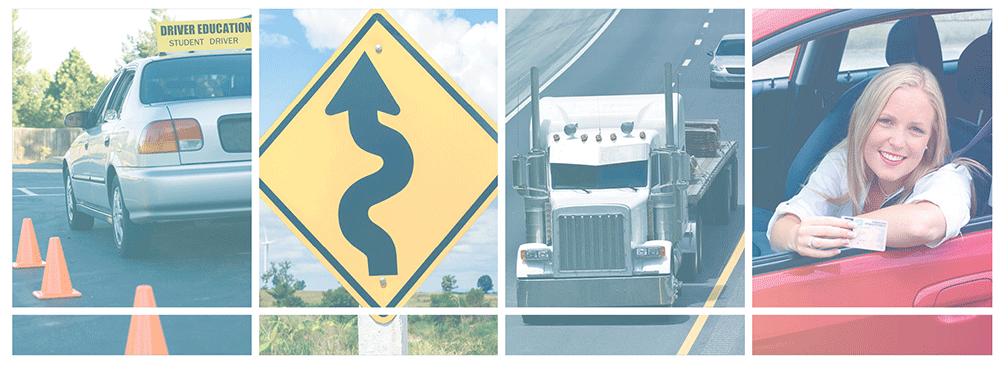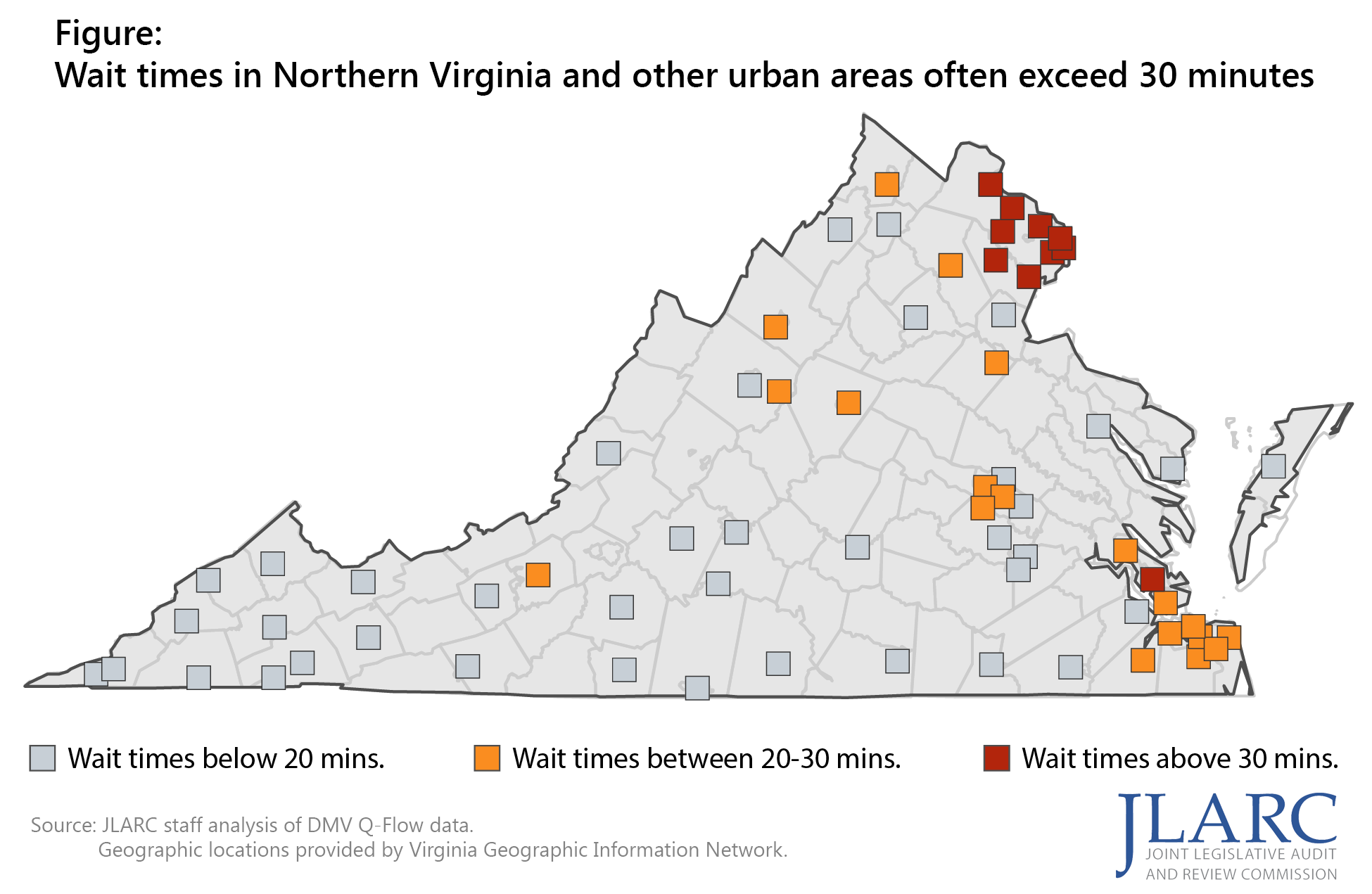Assessing the Performance of Virginia’s DMV

WHY WE DID THIS STUDY
The Joint Legislative Audit and Review Commission (JLARC) adopted a resolution directing staff to review the Department of Motor Vehicles (DMV). The resolution directs staff to address the cost-effectiveness of services and the agency’s role in identity management.
ABOUT THE DMV
The Virginia Department of Motor Vehicles is responsible for administering the state’s motor vehicle and tax-related laws. DMV provides a wide array of services to Virginia residents and businesses: driver’s licenses and vehicle registrations and titles are among the most common. DMV has 75 customer service centers (CSCs) located throughout the state. DMV receives no general fund moneys; it is funded through a portion of the revenue it collects. DMV also contracts with other entities that provide services, including 54 DMV Select offices operated by constitutional officers, town governments, and for-profit entities.
WHAT WE FOUND
Virginia’s DMV spending and staffing are similar to other states; spending has increased moderately
Virginia’s DMV spending ($40 per licensed driver) and staffing (0.37 staff per 1,000 licensed drivers) are close to the average of other states with similarly structured motor vehicle agencies. DMV’s spending increased a moderate one percent annually, on average, between FY 2005 and FY 2014, adjusted for inflation. The primary driver of this higher spending was information technology (IT).
DMV’s efforts to minimize error and fraud appear reasonable
DMV appears to be taking reasonable action to minimize the possibility of error and fraud in its transactions through rigorous processes it has put in place. These processes reduce the likelihood that identification will be issued based on fraudulent documentation. DMV’s processes are consistent with practices recommended by the American Association of Motor Vehicle Administrators.
DMV IT security concerns need to be addressed
Keeping IT systems secure is an ongoing and growing challenge. DMV’s systems hold a substantial amount of sensitive information, including social security and credit card numbers. As of October 2015, DMV has yet to comply with key payment card industry standards that were effective as of January 2015. The Auditor of Public Accounts has cited the need for DMV to make a variety of improvements related to IT security. These include disaster recovery preparations, database security controls for two systems, physical controls of a server room, and regular security audits. DMV is aware of these issues and taking several steps to address the audit items.
Virginians have adequate access to in-person service
Ninety-five percent of Virginians live within a 30-minute drive of a CSC, and nearly 80 percent live within a 15-minute drive. Although CSCs are located in all areas of the state, they tend to be concentrated in highly populated areas. Compared to other states with similarly structured motor vehicle agencies, Virginia has slightly more offices per licensed driver but slightly fewer per square mile.
DMV Selects provide additional access to in-person services and are a cost-effective way for DMV to provide these services. Constitutional officers, who receive financial support for facility and staff costs from the state, operate the majority of Selects. Because DMV does not reimburse Selects for operating costs, transactions cost DMV about half as much at a Select compared to a CSC.
Selects have raised concern in recent years about the adequacy of DMV reimbursement, but the case has not been made based on objective data that increases are needed. Selects have sought and obtained additional reimbursement several times within the last decade. All transactions performed at Selects can also be performed through other service options, and many can be performed online.
Use of Internet for DMV transactions is steadily increasing, but many people still choose more costly in-person services
Although the use of the Internet for transactions is steadily increasing, many customers still obtain services by going to CSCs. Thirty-three percent of all transactions occur via the Internet, up from 16 percent in FY 2011. Not all services can be obtained online, though, because of requirements to take tests or physically show certain documentation.
Despite the efforts of the General Assembly and DMV to encourage customers to use the cheaper alternative service options, nearly one-fifth of all CSC transactions were by customers who could have conducted the transaction through an alternative option. This equates to about 866,000 customers who paid the walk-in fee to use a CSC, mostly to renew a vehicle registration.
Customers who paid the walk-in fee tended to visit a CSC within either the first or the last five days of the month, which is also when CSCs are at their busiest. These customers not only pay more for service, but increase wait times for customers whose only option is to obtain in-person service at a CSC.
Customers at larger CSCs in Northern Virginia face substantial wait times before being served
Customers who came to CSCs in FY 2014 waited, on average, 24 minutes after they obtained a customer service ticket. This is longer than DMV’s target wait time of 20 minutes, and it does not include the time a customer may spend waiting in line to receive a ticket.
Customers at large CSCs, particularly those in Northern Virginia and those with complex transactions, face substantially longer wait times (see figure). Of the nearly 500,000 customers who waited more than an hour in FY 2014, 80 percent were at large CSCs and half of these were in Northern Virginia. The CSC in Tysons Corner is the highest volume CSC, averaging 557 customers per day and more than 700 customers on its busiest days. Customers at high volume CSCs in Northern Virginia waited 34 minutes, on average, and 47 minutes at the Arlington CSC.
DMV is beginning to expand its capacity in Northern Virginia by adding two CSCs and relocating several CSCs to larger facilities, which will reduce wait times in the region to some degree. It is unclear, though, by how much this new capacity will reduce wait times.

WHAT WE RECOMMEND
Legislative action
- Direct DMV through the Appropriation Act to develop a proposal to reduce wait times at high volume CSCs, especially in Northern Virginia.
Executive action
- Develop a plan to ensure IT security audits are performed.
The complete list of recommendations is available here.

